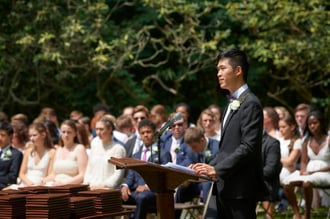As a new ninth-grader at Westtown—a 14-hour plane ride from his home—Yiheng Xie was

once told his accent was hard to define. In this (abridged) reflection delivered at graduation, Yiheng explores the connection between voice and family history—the “grit and sand” in his words—and how every person and experience we carry with us, can leave its mark.
Yiheng was awarded a Faculty Letter of Commendation, Westtown School’s highest recognition for achievement and citizenship, three years in a row. He currently attends Brown University.
My freshman-year proctor once said, “You have a unique accent.” It couldn’t be easily defined—it wasn't simply Chinese or American, refined or crude. Puzzling over why, I decided to trace its origin.
Ever since I was a kid, I have been collecting snippets of my parents’ childhood to complete this giant puzzle of where I came from. For every summer I could remember, my parents would take me to our hometown. When the asphalt highway gives way to gravel roads, and finally bumpy dirt paths, we would be back in rural Anhui and Jiangsu, where unassuming homes are scattered among canola fields and rice paddies.
When Mom was young, she would spend nights studying under the kerosene lamp, and wake up with a nose filled with soot. On rainy mornings, my father’s shoes would be caked with mud, and his walk to school on a near-empty stomach would become a trudge. Somehow they became the first college students in their village.
My parents were first-generation immigrants in the city of Shanghai, and Shanghainese take great pride in their refined vernacular. I never learned to speak Shanghainese as a kid. Instead, I spoke a mixture of rural dialect and Mandarin—raw and inelegant. I faced scrutiny when I answered teachers’ questions. I felt different, and took note that language was the key into a community.
When I came to Westtown, the shifting of context yet again highlighted the thickness in my tone, this time in English. My accent was gritty. But it was in the freshmen English course, The Outsider in Literature—the very role I occupied both in literature and in this foreign land—when I realized my voice mattered. I wasn’t just encouraged to contribute to discussions but was expected to; yet, I stumbled, messily stringing words together to share my ideas. I was determined to speak with an authentic American accent.
Luckily, I’ve been surrounded by many authentic voices. At Westtown, we gather weekly in the Meeting House in purposeful silence, which is broken only when messages are shared. Through listening closely to the stories in our community, I’ve realized the authentic American accent is impossible to define, and the importance of our words lies far less in how we say them than in the meanings they hold.
I have come closer to understanding both the grit and sand in my accent, and the soot and mud in my family’s memory. At this place where my difference was valued, I have finally unpacked the gift my parents have left me. My accent really isn’t my accent after all. It is the mixture of every person I have ever talked to. I pick up small phrases and intonations from my friends and teachers, and they’ve merged.
In these fleeting moments we share, it is reassuring to know that I will be carrying bits and pieces of each of us—in my accent, my habits, and the way that I think. Although these marks are sometimes confusing for me, and unexpected to strangers, they are my story.



